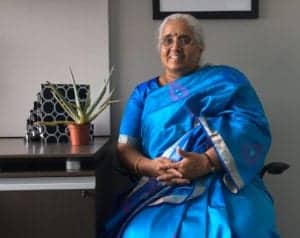Vijayalakshmi Das sits in the chair across from me, wearing a warm smile, smart-looking glasses and a brilliant blue and gold sari that seems to embody her personality. “Viji,” as she tells me she is more commonly known, has been a strong advocate for women’s financial inclusion in India for more than 25 years, currently Managing Director of Ananya Finance for Inclusive Growth and CEO of FWWB India. I had the chance to speak with her briefly when she visited Women’s World Banking in New York in January.
You have had a long and successful career championing for women’s financial inclusion in India. Why did you decide to work in this industry?
[youtube https://youtu.be/DDHFsMpwlVE&align=right&w=300&h=169 ]In India, even though we have millions of women goddesses, culturally, women are suppressed in many ways. And so we realized people like me who were interested in gender development thought that the social empowerment of women would be difficult to achieve. So we thought that maybe through economic empowerment we could achieve the social empowerment of women. Economic empowerment changes her status- women [become more] assertive because they have access to financial resources. I think we have seen the result of financial services’ impact of women’s status in the family and I think it’s the right thing to do so we will continue to do it.
So you knew women’s financial empowerment was going to be a difficult path to pursue. It’s also a complex issue to try to resolve. How did you know where to start?
About fifteen years back me and another colleague of mine, Jayshree (Vyas of SEWA Bank), did a lot of training in the field. There was one time where we were holding a training for women farm laborers about things like opening an account, savings and credit groups and about regular small savings accounts. I noticed there was a woman lurking behind a big tree listening to us talk. I asked her to come sit with us but she said “No, I belong to this , I can’t sit with these women who are lower caste.” So after the meeting I asked her why she was interested in our training discussion. She said, “all the women in the meeting work in my husband’s field and they have opened a bank account. Meanwhile, I am the landlord’s wife and I don’t have an account. I don’t have a source of saving money. I feel these laborers who work in my husband’s fields are much more empowered than me because they have access to a savings account.” After this, Jayshree and I started to think that this has nothing to do with income levels. Women who do not have access to financial resources, products and services do not feel empowered. Women want to have a bank account to feel empowered.
Another story that was impactful to me was when we gave a loan to a woman to buy a cow. As a monitoring visit we went to see her. The cow was not there but we knew she was regularly repaying the money. She said that she had sold the cow off because her husband was ill and she needed to raise money. We said to her, “but the loan was supposed to help generate an income for you and out of the income you are supposed to pay back the loan. How are you managing it?” She said, “To me, the priority is saving the life of my husband. The asset is meaningless to me without my husband.” This triggered our whole thinking of micro-insurance.
It is small stories like these that helped us to identify the constraints that women face and the reality of society. For her that cow- which was worth 40,000- is nothing because for her it was her husband’s health that was the most important. She was proud that the asset she owned was able to help to save her husband. These are the kinds of realities you have to look at.
These stories also explain a kind of vulnerability that we never thought that women would have. The one story helped us to include not-so-low-income women. The second story triggered us to seriously start thinking about micro-insurance. We also learned that irrespective of losing her asset, she honored her loan. It was very important for her to continue to be positively associated with the loan so that she can have access to credit facilities.
Let’s talk about the present day. You say you’ve seen improvements in the industry. What about the Indian government? They recently launched a new scheme to support the development of small entrepreneurs which would include women. Do you think the financial framework of the Indian government will be impactful for women?
Do you want me to be honest or dishonest? [laughs] No, they have announced a lot of schemes but we do not see a clear-cut strategy of including women. There are lots of promises made about women having bank accounts, but that is not going to result in the kind of impact you would have if you focused this work in a deeper way. Opening an account is very easy but helping women to access the money and use the account for deposits and taking out money; that’s very critical. And so specific mention of women as a segment- that has to be included [as part of the government’s plan]. They have to invest in spreading awareness about the usage of bank accounts and other financial services. Whether you want to call it financial education or financial literacy, that investment in teaching is the minimum.
This interview has been edited and condensed for clarity.
Read more about Viji’s story in the e-book, Celebrating Women Leaders: Profiles of Financial Inclusion Pioneers, a collaboration between Ujjivan Financial Services Ltd. and Women’s World Banking.




